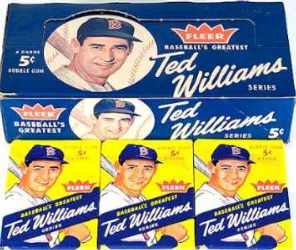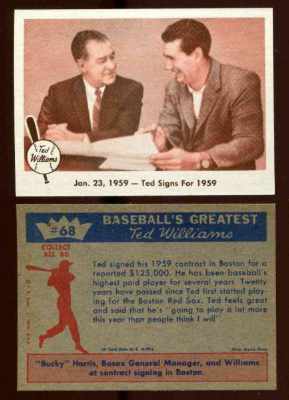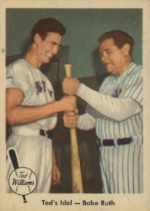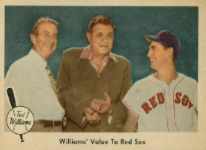O.J. Simpson - COLLECTION (1974-1994) - Lot of (35) w/(11) different
With (7) 1970's Topps cards (VG to EX), all other cards are NM/MINT. With a Ted Williams O.J. POG.

Please wander around the website for more info, prices, values & images
on vintage baseball, football, basketball, hockey, sport and non-sports cards.
Vintage Topps 1956 Baseball Cards |

Autographed Gateway Cachets
Gateway Stamp Company has provided collectors well over 1 MILLION
authenticated certified autographs over the last 30 years.
Silk Cachets from Gateway Stamp Company Even though a "stamp company", Gateway rarely dealt in stamps, going down a new and creative road becoming one of the world's most unique secrets in autograph collecting combining the best in art, color photographs, history and autographs with their full-color silk cachet envelopes. Gateway's first client was Cardinals Hall of Famer Lou Brock with hundreds to follow.
WHAT ARE FULL-COLOR SILK CACHETS?
WHY POSTMARKS? |

1959 Fleer Ted Williams baseball cards |

Die-Cut A special card that differs from a basic card by "Die-Cutting", cutting away portions of the card to create a special design. Most are serially numbered & limited.
Error Card Baseball card history is filled with error cards, many of them very interesting. Hank Aaron is on 2 of my favorite error cards. Aaron's 1956 Topps card action photo shows Aaron sliding home but it is actually Willie Mays not Aaron. Topps again goofed on Aaron's 1957 "reversed negative" card showing Aaron batting left-handed.
"Error Cards" are usually found early in print runs and often corrected. When this correction happens a VARIATION is created. Some variations are extremely interesting and very expensive while others are totally boring and you wonder why they were even made.
Extended Set Also frequently called Update Set or
Traded Set.
They are sets issued after the original release to update the regular set
with new and traded players.
Facsimile Autograph is an autograph printed on a card to show what the player's actual signature looks like. They are not "real" autographs.
Factory Set are complete sets usually in special boxes produced by the manufacturer. "Hand-Collated Sets" are sets collectors have put together card by card from packs.

 1956 Topps were slightly larger (3-3/4" by 2 5/8") horizontal cards
similar to 1955 Topps cards, some even sharing portraits with 1954 and 1955
Topps cards. Team cards & checklists appeared for the first time in 1956.
1956 Topps were slightly larger (3-3/4" by 2 5/8") horizontal cards
similar to 1955 Topps cards, some even sharing portraits with 1954 and 1955
Topps cards. Team cards & checklists appeared for the first time in 1956. 


 This special 80-card set from the Frank H. Fleer Company honors Ted Williams,
"The Splendid Splinter." While other companies vied for Topps' exclusive player
rights, Fleer successfully secured Ted Williams, who, nearing the end of his
career, remained one of the best and most popular players.
This special 80-card set from the Frank H. Fleer Company honors Ted Williams,
"The Splendid Splinter." While other companies vied for Topps' exclusive player
rights, Fleer successfully secured Ted Williams, who, nearing the end of his
career, remained one of the best and most popular players.
 Of particular note is Card #68, "Ted Signs for 1959," which pictures him signing
his contract. The photo also included Red Sox GM Bucky Harris, who was under one
of those exclusive deals with Topps at the time. This led to the card being pulled,
making it extremely scarce. Unfortunately, reprints of the card surfaced in the
1970s. This is widely considered the first baseball card to be
reprinted/counterfeited. Interestingly, the counterfeits were allowed to remain
on the market, so caution is advised when dealing with this card.
Of particular note is Card #68, "Ted Signs for 1959," which pictures him signing
his contract. The photo also included Red Sox GM Bucky Harris, who was under one
of those exclusive deals with Topps at the time. This led to the card being pulled,
making it extremely scarce. Unfortunately, reprints of the card surfaced in the
1970s. This is widely considered the first baseball card to be
reprinted/counterfeited. Interestingly, the counterfeits were allowed to remain
on the market, so caution is advised when dealing with this card.
 Cards were sold in both six-card and eight-card wax packs. For some reason,
the scarcer 8-card packs contained no gum.
Cards were sold in both six-card and eight-card wax packs. For some reason,
the scarcer 8-card packs contained no gum.

